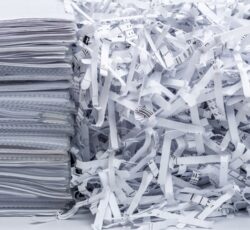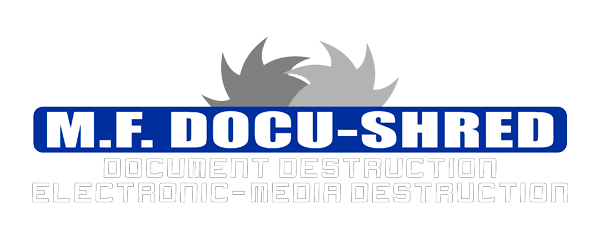 In today’s digital age, with information being increasingly stored and shared electronically, it’s easy to overlook the importance of properly disposing of physical documents. However, for healthcare providers, adherence to the Health Insurance Portability and Accountability Act (HIPAA) is crucial in ensuring that sensitive patient information remains private and secure. One aspect of HIPAA compliance that often goes unnoticed is the proper disposal of paper documents. In this blog post, we will explore the HIPAA standards for paper shredding, highlighting the importance of secure document destruction and the steps healthcare organizations should take to ensure compliance.
In today’s digital age, with information being increasingly stored and shared electronically, it’s easy to overlook the importance of properly disposing of physical documents. However, for healthcare providers, adherence to the Health Insurance Portability and Accountability Act (HIPAA) is crucial in ensuring that sensitive patient information remains private and secure. One aspect of HIPAA compliance that often goes unnoticed is the proper disposal of paper documents. In this blog post, we will explore the HIPAA standards for paper shredding, highlighting the importance of secure document destruction and the steps healthcare organizations should take to ensure compliance.
1. Understanding the Importance of Secure Document Destruction
The main goal of HIPAA’s Privacy Rule is to protect individuals’ Personally Identifiable Information (PII), including their health records. Paper documents that contain PII, such as medical histories, treatment plans, or insurance information, can pose a substantial risk if mishandled or disposed of improperly. Unauthorized access to these documents can lead to financial fraud, identity theft, or even potential blackmail. Therefore, healthcare organizations must take steps to safeguard patient information throughout its lifecycle, including secure disposal when it’s no longer needed.
2. HIPAA’s Requirements for Paper Shredding
HIPAA explicitly requires Covered Entities (CEs) and their Business Associates (BAs) to implement safeguards to protect PHI from unauthorized access or disclosure. Although the Security Rule extensively covers electronic protected health information (ePHI), it also addresses the need to secure and dispose of physical records properly.
Under the Security Rule, HIPAA expects organizations to:
Implement policies and procedures:
Develop a set of comprehensive policies and procedures for the proper disposal of paper records. These policies should outline the specific requirements for document destruction, including the use of secure shredding methods.
Execute workforce training:
Ensure that all employees, both administrative and clinical staff, receive adequate training on HIPAA regulations and the organization’s specific policies regarding document disposal. This training should emphasize the importance of maintaining patient privacy and the proper handling of sensitive information.
Conduct periodic risk assessments:
Periodically assess the risks associated with document disposal, taking into account the volume and nature of the information being discarded. This assessment should guide the organization in determining the appropriate shredding practices required to mitigate those risks effectively.
Implement secure disposal methods:
Choose a secure shredding method that effectively destroys documents so that they cannot be recreated or accessed. The shredding process should render the documents irrecoverable, ensuring protection against any potential breaches.
3. Best Practices for HIPAA-Compliant Paper Shredding
To meet HIPAA’s standards, healthcare organizations must adopt best practices for paper shredding. Consider the following guidelines:
- Invest in cross-cut shredding machines: Use shredders that produce confetti-like particles rather than long strips. Cross-cut shredding ensures better security by significantly reducing the chance of document reconstruction.
- Outsource shredding services: Consider outsourcing the document destruction process to a professional shredding service provider. These companies specialize in secure disposal and provide a chain of custody for the documents until they are destroyed, offering an added layer of protection.
- Use secure shredding containers: Provide secure collection containers, such as locked bins or consoles, in areas where documents are generated or stored. Ensure that these containers are regularly emptied and their contents are handled following secure protocols.
- Document destruction logs: Create logs that track the date, time, and type of documents destroyed. This recordkeeping will help demonstrate compliance during audits while also serving as evidence of adherence to HIPAA standards.
- Secure disposal of shredded materials: Develop a system for securely disposing of the shredded material, such as using certified recycling services. Ensure that the shredded paper does not get mixed with regular trash to maintain the privacy of the information contained within.
4. Consequences of Non-Compliance
Non-compliance with HIPAA’s paper shredding standards can lead to severe penalties. The Office for Civil Rights (OCR), responsible for enforcing HIPAA regulations, can assess significant fines, reaching up to $1.5 million per year, depending on the severity and extent of the violation. Additionally, the reputational damage that non-compliance brings to healthcare organizations can be irreparable.
Summary
Proper disposal of paper documents is a critical component of HIPAA compliance. Healthcare organizations must take the necessary steps to protect patient privacy by implementing secure shredding methods, training employees, conducting risk assessments, and following best practices. By adhering to HIPAA’s paper shredding standards, these organizations can safeguard sensitive information, mitigate risks, and ensure compliance with the law.
Need Reliable Document Destruction in Liberal, KS?
M.F. Docu-Shred offers recurring container and scheduled purge services for businesses located in Southwest Kansas and the Oklahoma Panhandle. We also offer one-time destruction services to small businesses and residential customers that need high-end data protection on an infrequent basis. Document shredding and digital storage device destruction are a must for anyone that must protect the identities, personal details, financial information, and other personal facts about clients by law. Recent legislation includes California v. Greenwood, Health Insurance Portability and Accountability Act (HIPPA), Gramm-Leach-Bliley Act (GLBA), Bill C-6, and the Fair and Accurate Transaction Act (FACTA). Give us a call today to learn more about what we can do for you!

